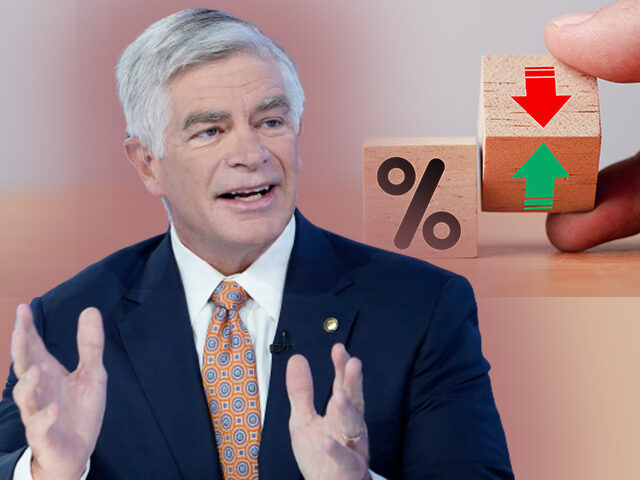Harker, the Herald of Soft-Landings, Sings
If the Federal Reserve would listen to the sounds of inflation rattling through the economy, it would be a bit less comfortable with the idea that the haunting has been exorcised.
Unfortunately, Fed officials have been sending the signal in recent days that they believe they have driven a stake through the heart of rising price levels and that the monster they helped create is unlikely to come back as the walking dead.
Philadelphia Federal Reserve President Patrick Harker said on Monday that he believes it is time for the Fed to stop raising rates, reiterating a view he expressed last week. In a speech to the Mortgage Bankers’ Association entitled “Giving the Economy Time to Catch Its Breath,” Harker focused a lot of attention on the costs of higher rates. Not surprisingly, given his audience was mortgage bankers, the damage higher mortgage rates are inflicting on the economy played a large role in his talk.
The crux of Harker’s speech was that the Fed appears to have won its fight against inflation and that the economy is headed toward a soft landing:
After our last policy rate hike in July, I went on the record with my view that, if economic and financial conditions evolve roughly as I expect, we can hold rates where they are. And, so far, economic and financial conditions are evolving as I expected, perhaps even a tad better.
Disinflation is under way, labor markets are coming into better balance, and economic activity continues to be resilient.
Looking back, we did a lot, and we did it very fast. In fact, I heard that summation from some of your peers throughout the summer. In barely more than a year, we increased the policy rate by more than 5 percentage points and to its highest level in more than two decades. We also turned around our balance sheet policy, and we turned it around fast.
The workings of the economy cannot be rushed, and it will take some time for the full impact of the higher rates to be fully absorbed. What I have heard this summer is an appeal to give you and your customers the thing you wanted most: time to catch your breath.
But my argument is that by doing nothing, we are doing something. And I think we are doing quite a lot. Look where we are — headline PCE inflation remained elevated in August at 3.5 percent year over year, but it is down 3 percentage points from this time last year.
Just in case there is any doubt about what this means, Harker literally said we are headed for a soft landing. He not only said it, but he emphasized it in the prepared text of his remarks.
“I believe such a resolute, but patient, stance of monetary policy will allow us to achieve the soft landing that we all wish for our economy,” Harker said. “And with that landing, we’ll be able to see our economy take off again, but this time on a clear and stable path forward.”
If this were a horror movie, that’s exactly the sort of thing one of the survivors of earlier attacks would say just before the jump scare.
A Holiday Sales Jump Scare
If the Federal Reserve’s policies are actually restrictive, it seems that someone forgot to tell the American consumer. The National Retail Federation estimates that spending around Halloween will be up by around 15 percent this year, to a record high of $12.2 billion. Spending on costumes is forecast to rise 13.9 percent. Spending on candy is set to rise 16.9 percent. This does not look like the shopping patterns of a consumer that needs to catch her breath.
Of course, the grip of rising demand will not end with Halloween. Nearly three in four shoppers surveyed by Gallup and Shopify said plan to spend the same amount or more on holiday gifts this year compared to last year. Among the youngest shoppers, aged 18 through 29, 37 percent said they plan to spend more this year.
The annual holiday shopping survey from Dealaid.org found an explosive increase in expectations for spending this holiday season. Last year, the survey found 48.2 percent of Americans said they expected to spend less during the holiday shopping season, with the average projected holiday shopping falling 3.4 percent from the prior year, a drop to $941 from $974.
This year, just three percent of Americans say they expect to spend less. Forty-nine percent say they expect to spend more, and another 48 percent said they expect to spend the same as last year.
The best explanation for this shift is a change in consumer expectations around inflation. Last year, it appears that consumers had not yet fully caught on to the idea that inflation was driving up the prices of things they were planning to put under the Christmas tree. Or maybe they were just in denial about their ability to contain their spending despite high prices. Now consumers are ready for inflation and expecting to spend more.
That should be worrying when it comes to inflation staying contained. Some of the lightest months we saw last year for increases in the consumer price index came in November and December, in part because retailers had overstocked merchandise and were aggressively discounting items to clear the shelves before the end of the year. Prices rose just 0.2 percent in November compared with the prior month and 0.1 percent in December.
With consumers expecting to spend more this year, discounts are likely to be lighter. This could mean that inflation stays elevated through the holiday season.
Pay close attention to the September retail sales figures on Tuesday. The consensus is for overall sales to rise 0.3 percent for the month and for sales excluding gas and vehicles to inch up 0.1 percent. An upside surprise could be the signal that the “restrictive stance” of monetary policy is doing far less than Harker thinks.


COMMENTS
Please let us know if you're having issues with commenting.